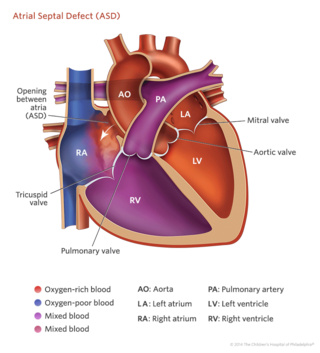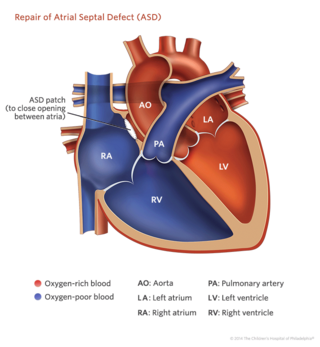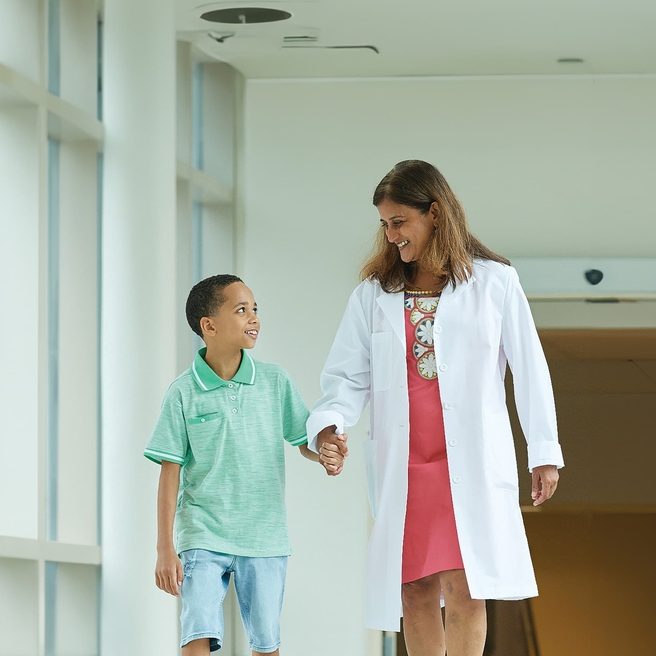What is an atrial septal defect?
An atrial septal defect (ASD) is a congenital heart disease in which there is an opening in the wall (the atrial septum) between the heart's two upper chambers (the right and left atria). An ASD is one of the defects referred to as "a hole in the heart."
Normally, the heart has two sides, which are separated by a muscular wall called the septum. The right side of the heart carries deoxygenated or blue blood back into the heart to go to the lungs to pick up oxygen and the left side carries oxygenated or red blood back out to the body. Each side of the heart also has two parts — the upper chamber, called an atrium, and the lower chamber, called a ventricle.
An ASD or hole in the septum allows the oxygenated blood to pass from the left atrium, through the opening in the septum, and into the right atrium, causing the blood to mix. This leads to increased blood flow through the right side of the heart and lungs. Over time, this "extra" blood volume stresses the heart and causes the right atrium, ventricle and pulmonary arteries to dilate (become wider). This can eventually lead to heart failure, pulmonary hypertension and/or heart rhythm abnormalities.

Signs and symptoms of atrial septal defect
Unless the hole in the heart is large, an ASD won't usually cause symptoms. Large holes can cause symptoms in later childhood or adulthood due to the increased blood flow through the right side of the heart. Symptoms of atrial septal defect may include:
- Heart murmur: the heart sounds abnormal when a doctor listens with a stethoscope
- Fatigue or shortness of breath
- Racing heartbeat (palpitations)
Testing and diagnosis of ASD
Your child's primary care doctor may refer you to the Cardiac Center for evaluation. Diagnosis of atrial septal defect may require some or all of these tests:
- Echocardiogram (also called "echo" or ultrasound): sound waves create an image of the heart
- Electrocardiogram (ECG): a record of the electrical activity of the heart
- Chest X-ray
Treatment for atrial septal defect
Some small ASDs close on their own. This often happens before a child turns 2 years old, so your doctor may decide to wait and see whether the atrial septal defect closes on its own.
If the ASD is large, or doesn't close on its own, closure is recommended. At the Cardiac Center at CHOP, our doctors are among the most experienced in the nation in ASD closure. Treatment options include:
Cardiac catheterization
In many cases, an ASD can be closed during a cardiac catheterization procedure. An interventional cardiologist will insert a thin tube (catheter) through a large vein in the leg, then guide it up into the heart. A device is then delivered through the catheter to close the hole.
Because each ASD is unique, cardiologists will choose a closure device that is best suited to your child based on the particular features of the hole (size, location, amount of tissue surrounding the hole, etc.). The device will be placed using both ultrasound and x-ray guidance to ensure proper positioning and stability.
Most children will spend one night in the hospital after this procedure, in CHOP’s dedicated post-catheterization recovery unit, before returning home. They will also need to rest for the next few days, but then can resume normal activity.
Open heart surgery
In cases where the hole is very large, or the heart anatomy is either complex or not suitable for a device, surgery may be required. Surgeons use patches to close the hole. After surgery, patients initially recover in the Evelyn and Daniel M. Tabas Cardiac Intensive Care Unit (CICU), where they will receive round-the-clock attention from a team of dedicated cardiac critical care medicine specialists, and then in the Cardiac Care Unit as they improve.

Outlook for ASD
Because of enormous strides in medicine and technology, today nearly all children with atrial septal defects go on to lead healthy, productive lives as adults.
Follow-up care for ASD
Through 18
After ASD repair, most children recover quickly and don't experience additional cardiac problems. Children with ASD must see a pediatric cardiologist for regular checkups. Rarely, additional surgery is required.
Children who have other heart abnormalities will require more extensive follow-up care.
Our pediatric cardiologists follow patients until they are young adults, coordinating care with the primary care physicians.
Into adulthood
Follow-up care into adulthood may be necessary for children with ASD. We will help with the transition to an adult cardiologist.
The Philadelphia Adult Congenital Heart Center , a joint program of The Children's Hospital of Philadelphia and Penn Medicine, meets the unique needs of adults who were born with heart defects.

Why Choose Us
Our specialists are leading the way in the diagnosis, treatment and research of congenital and acquired heart conditions.
Resources to help
Cardiac Center Resources
We know that caring for a child with a heart condition can be stressful. To help you find answers to your questions – either before or after visiting the Cardiac Center – we’ve created this list of educational health resources.
Reviewed by Stephanie Fuller, MD
Reviewed on 10/17/2024
